|

‘Connecting Girls, Inspiring Futures’, the theme of
Int’l Women’s Day 2012 on March 8:
Woman - the fountain of life
By Indunil THENUWARA
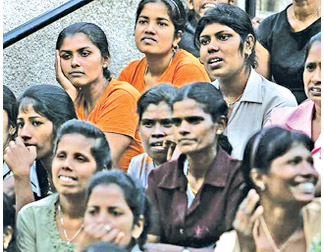
Lankan women |
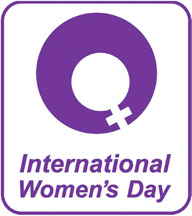 “Women hold up half the sky”, said Mao Tse-tung. This rings true in
most places on Earth, especially in countries such as Sri Lanka where
women contribute much more than ‘half’ to the national economy (think
foreign remittances and garment and tea exports). “Women hold up half the sky”, said Mao Tse-tung. This rings true in
most places on Earth, especially in countries such as Sri Lanka where
women contribute much more than ‘half’ to the national economy (think
foreign remittances and garment and tea exports).
However, is their immense contribution to the national economies of
the world, to social and cultural development, to science, technology
and art, to life itself, recognised and appreciated? Hardly!
Women continue to be harassed, discriminated against and abused all
over the world and despite advances made in the right direction, there
is no place on Earth where men and women truly enjoy equal rights,
privileges and opportunities.
Women have gone far and achieved much: in most countries including
Sri Lanka, girls outperform boys in examinations at school and
university; more women join the workforce annually and hold top
positions especially in the public sector. However, the percentage of
women in decision-making positions in governments as well as top
corporate bodies is woefully inadequate (Half of the FTSE 250 companies
have no women on their boards).
Despite more women working, their hourly earnings are 80 percent of
those of men. Seventy percent of the global population living in poverty
is said to comprise women. Rape within marriage as well as female
foeticide still exists in some societies despite the practices being
technically illegal. Dowry killing still remains a sore spot in India
where it is reported, on average a wife is killed every hour. A gaping
chasm remains between legal equality and individuals’ behaviour and
attitudes.
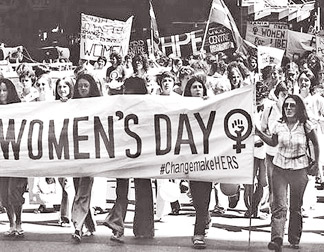 |
| A poster for a
Women’s Day campaign |
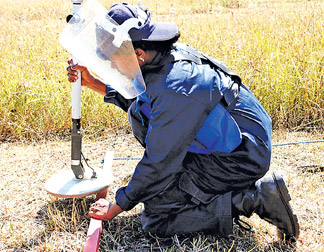 |
| Sri Lankan
women are involved in ‘non-traditional’ tasks such as demining
too |
Pushing further towards attitudinal change, recognising, appreciating
and celebrating the vast strides made by women as well as their
contribution to every sector in life and initiating further steps to
dismantle existing barriers against the full advancement and
emancipation of women are the objectives of International Women’s Day
(IWD) which is celebrated on March 8 every year.
The theme
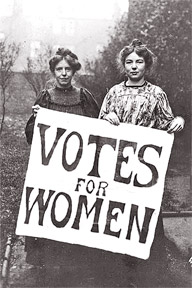
Women demanding voting rights |
The theme for this year, as designated by the United Nations, is
‘Connecting Girls, Inspiring Futures’ and focuses on the role of girls
and encouraging their involvement in the growth of society. It’s a call
for action, to encourage organisations and groups to think carefully
about key messages for the women of tomorrow and to share these messages
in a positive way to impact the minds and aspirations of girls.
The focus of all events to be organised around the world in
connection with the day, from political rallies, business conferences,
government activities and networking events to exhibitions, theatre
performances and fashion parades, would be on expanding awareness about
the issues girls around the world face and on the improvement of the
economic, social and political lives of women of the future by enhancing
the choices for the girls of today.
By connecting girls, the future leaders of the world, to the school,
to the Internet and to each other, it is assumed that they will change
their lives, their families as well as their communities for the better.
Current estimates
According to current estimates, of the 101 million illiterate youth
in the world, more than half are girls. Seventy million children around
the world are not attending school, of which nearly 60 percent are
girls. When families face hard times, girls are the first to be removed
from school, denied access to health and nutrition and thrust with the
responsibility of looking after their younger siblings.
However, the world has proved time and again that educating girls
leads to stronger and healthier families, communities, countries and
societies, and lifts not just individuals, but entire communities out of
poverty.
It has been proven that investing in girls and women is not just the
right thing, but the smart thing to do.
Higher investments in girls’ education, primary and secondary, has
brought about a marked drop in early pregnancy, leading to a reduction
in maternal mortality. As the victims of most maternal deaths in
developing countries are girls between the ages of 15 and 19 years,
education would have a direct bearing on reducing the number of such
deaths. Education has also considerably reduced incidences of early
marriage, especially early forced marriage, and HIV infection in girls
and women.
All governments, especially those in developing countries should
enact legislation to ensure that girls have equal and equitable access
to education as the investment in educating girls may bring in more
dividends than any other sector.
Young girls are a segment of society that have untapped potential.
They have the power to inspire others and change things for the better.
Their involvement in different developments can ensure that the
advancement of women’s rights and promotion of gender equality grow,
gather momentum and continue through future generations.
Most young women view feminism as an outdated and historic concept
which is only for radicals. Awareness has to be created within them that
it’s not so, that it’s very much a current movement and one in which
young women play a vital role. Though some view ‘feminism’ in a negative
light, the movement has one laudable goal: a better world for women and
girls, which means a better world for everyone.
Women should learn to question gender imbalances whether at home or
at work and in all walks of life. Men also have a role to play, in
challenging traditional assumptions, gender stereotypes and outdated
attitudes.
An important factor in equality is early socialisation; boys and
girls should be provided with early childhood education so that they all
grow up with the same values and opportunities. Most films, television
programs, novels and even school textbooks perpetuate gender
stereotypes. These have to be changed to portray men and women as
equals. It is important that the same opportunities and access to
leadership roles are provided for both genders to create a peaceful and
more equal and balanced world.
Extraordinary role
A statement by UNWomen had described the day as a time to reflect on
progress made, to call for change and to celebrate acts of courage and
determination by ordinary women who have played an extraordinary role in
the history of their countries and communities.
The main objective of the IWD should be to make the women of the past
proud, the women of the present inspired and the women of the future
envisioned.
On IWD, humanity should once again renew its commitment to the
ongoing work towards women’s equal participation in economic and
political decision-making.
The world should commit itself to challenging the extent of violence
against one half of humanity by the other half that continues despite
ongoing efforts of individuals, governments and the international
community.
History of IWD
The first national Women’s Day was observed on February 28, 1909 in
the United States following a declaration by the Socialist Party of
America during a time of great expansion and turbulence in the
industrialised world, with rapid population growth and the rise of
radical ideologies. An International Women’s Conference was organised to
precede the general meeting of the Socialist Second International in
Copenhagen in August 1910. The proposal to establish an annual
International Women’s Day was made by German Socialist Luise Zietz at
this event and was seconded by Clara Zetkin. The 100 women delegates
from 17 countries who were present at the event agreed to the idea as a
strategy to promote equal rights, including suffrage for women.
The following year, on March 18, 1911, IWD was marked for the first
time by over a million people in Austria, Denmark, Germany and
Switzerland. Women demanded that they be given the right to vote and to
hold public office. They also protested against sex discrimination in
employment.
From its official adoption in Russia following the Soviet Revolution
in 1917, the event was predominantly celebrated in communist and
socialist countries. In the West, International Women’s Day was first
observed after 1977 when the United Nations General Assembly invited
member states to proclaim March 8 as the UN Day for Women’s Rights and
International Peace.
It was in 1975, which had been designated International Women’s Year,
that the United Nations had given official sanction to, and began
sponsoring, International Women’s Day.
Today, the day is a national holiday in most countries and many
events are held by governments, women’s groups, charities and other
organisations around the world. The United States has designated the
whole month of March as ‘Women’s History Month’. The 100th anniversary
of the event was celebrated last year.
|

